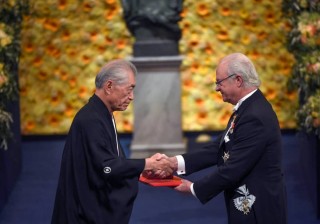Loading
Search
▼ Japanese Scientist Tasuku Honjo Receives Nobel For Physiology Or Medicine At Ceremony
- Category:Event
STOCKHOLM – Japanese scientist Tasuku Honjo received the Nobel Prize in physiology or medicine at a ceremony Monday in Stockholm for his discovery of a protein on immune cells that paved the way for a new approach to cancer treatment.
The 76-year-old Kyoto native, clad in traditional Japanese clothing to remember the roots of his research, accepted the medal and diploma from Swedish King Carl XVI Gustaf at the ceremony, which he attended with his wife Shigeko.
The distinguished professor and deputy director-general of the Kyoto University Institute for Advanced Study shared the prize with James Allison, a professor at the University of Texas, who studied a known protein that works as a brake on the immune system.
Honjo is the 27th Japan-born winner of a Nobel Prize. Yoshinori Osumi was the last such recipient of the physiology or medicine prize, in 2016.
The discovery of the protein called PD-1 by Honjo and his team in 1992 has led to the development of Opdivo, a drug that triggers the immune system to attack cancer cells.
Before the ceremony took place at the Stockholm Concert Hall, Denis Mukwege, a Congolese gynecologist, and Nadia Murad, a Yazidi human rights activist and victim of war crimes from Iraq, were conferred this year’s Nobel Peace Prize in Oslo for their work to end the use of sexual violence as a weapon of war and armed conflict.
The 76-year-old Kyoto native, clad in traditional Japanese clothing to remember the roots of his research, accepted the medal and diploma from Swedish King Carl XVI Gustaf at the ceremony, which he attended with his wife Shigeko.
The distinguished professor and deputy director-general of the Kyoto University Institute for Advanced Study shared the prize with James Allison, a professor at the University of Texas, who studied a known protein that works as a brake on the immune system.
Honjo is the 27th Japan-born winner of a Nobel Prize. Yoshinori Osumi was the last such recipient of the physiology or medicine prize, in 2016.
The discovery of the protein called PD-1 by Honjo and his team in 1992 has led to the development of Opdivo, a drug that triggers the immune system to attack cancer cells.
Before the ceremony took place at the Stockholm Concert Hall, Denis Mukwege, a Congolese gynecologist, and Nadia Murad, a Yazidi human rights activist and victim of war crimes from Iraq, were conferred this year’s Nobel Peace Prize in Oslo for their work to end the use of sexual violence as a weapon of war and armed conflict.
- December 11, 2018
- Comment (0)
- Trackback(0)


